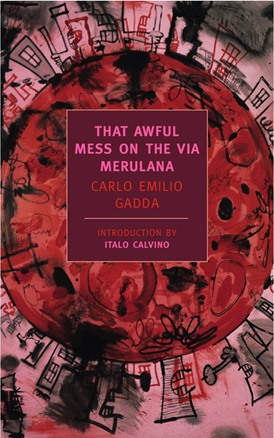Description
In a large apartment house in central Rome, two crimes are committed within a matter of days: a burglary, in which a good deal of money and precious jewels are taken, and a murder, as a young woman whose husband is out of town is found with her throat cut. Called in to investigate, melancholy Detective Ciccio, a secret admirer of the murdered woman and a friend of her husband’s, discovers that almost everyone in the apartment building is somehow involved in the case, and with each new development the mystery only deepens and broadens. Gadda’s sublimely different detective story presents a scathing picture of fascist Italy while tracking the elusiveness of the truth, the impossibility of proof, and the infinite complexity of the workings of fate, showing how they come into conflict with the demands of justice and love.
Italo Calvino, Pier Paolo Pasolini, and Alberto Moravia all considered That Awful Mess on the Via Merulana to be the great modern Italian novel. Unquestionably, it is a work of universal significance and protean genius: a rich social novel, a comic opera, an act of political resistance, a blazing feat of baroque wordplay, and a haunting story of life and death.
About the Author
Carlo Emilio Gadda was an Italian writer and poet. He belongs to the tradition of the language innovators, writers that played with the somewhat stiff standard pre-war Italian language, and added elements of dialects, technical jargon and wordplay.Gadda was a practising engineer from Milan, and he both loved and hated his job. Critics have compared him to other writers with a scientific background, such as Primo Levi, Robert Musil and Thomas Pynchon--a similar spirit of exactitude pervades some of Gadda's books.Carlo Emilio Gadda was born in Milan in 1893, and he was always intensely Milanese, although late in his life Florence and Rome also became an influence. Gadda's nickname is Il gran Lombardo, The Great Lombard: a reference to the famous lines 70-3 of Paradiso XVII, which predict the protection Dante would receive from Bartolomeo II della Scala of Verona during his exile from Florence: "Lo primo tuo refugio e 'l primo ostello / sarà la cortesia del gran Lombardo/ che 'n su la scala porta il santo uccello" ("Your first refuge and inn shall be the courtesy of the great Lombard, who bears on the ladder the sacred bird").Gadda's father died in 1909, leaving the family in reduced economic conditions; Gadda's mother, however, never tried to adopt a cheaper style of life. The paternal business ineptitude and the maternal obsession for keeping "face" and appearances turn up strongly in La cognizione del dolore.He studied in Milan, and while studying at the Politecnico di Milano (a university specialized in engineering and architecture), he volunteered for World War I. During the war he was a lieutenant of the Alpini corps, and led a machine-gun team. He was taken prisoner with his squad during the battle of Caporetto in Octorber 1917; his brother was killed in a plane--and this tragic event death features prominently in La cognizione del dolore. Gadda, who was a fervent nationalist at that time, was deeply humiliated by the months he had to spend in a German POW camp.After the war, in 1920, Gadda finally graduated. He practiced as an engineer until 1935, spending three of these years in Argentina. The country at that time was experiencing a booming economy, and Gadda used the experience for the fictional South American-cum-Brianza setting of La Cognizione del Dolore. After that, in the 1940s, he dedicated himself to literature. These were the years of fascism, that found him a grumbling and embittered pessimist. With age, his bitterness and misanthropy somewhat intensified--one of his less amiable traits was misery.There is some debate amongst scholars as regards Gadda's sexual orientation. Certainly, his work demonstrates a strongly subversive attitude towards bourgeois values, expressed above all by a discordant use of language interspersed with dialect, academic and technical jargon and dirty talk. This is particularly interesting as the criticism of the bourgoise life comes, as it were, from the inside, with the former engineer cutting a respectable figure in genteel poverty.
